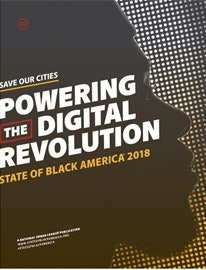What issues are most critical to Black scholarship in 2018?
The question may seem subjective, but researchers at the National Urban League have found the answers to such complex questions.
The venerable civil rights nonprofit has released its annual assessment of the socio-economic fitness titled,“Save Our Cities: Powering the Digital Revolution.”
This year’s “State of Black America” report, based on a compendium of data that compares and tracks Black, Hispanic, and White achievement, is organized into several broad categories such as health, civic engagement and social justice that function as indicators of socio-economic well-being.
When it comes to higher education, according to the report, two issues stand out: a persistent science and technology gap and crippling student debt, both of which affect students of color disproportionately, researchers say.
Post-secondary students of color are still, on the whole, less likely than White students to focus on subjects that fall within the rubric of science, technology, engineering and math (STEM). And those undergraduates who do choose a STEM major are less likely to continue their studies at the graduate level, the report notes.
That this disparity exists is not breaking news, but that so little progress has been made in the past decade is troubling to those in and out of academia.















